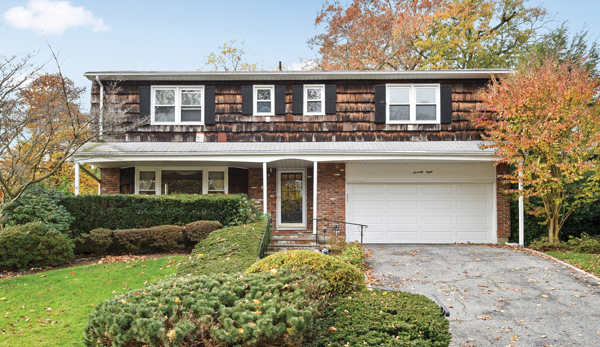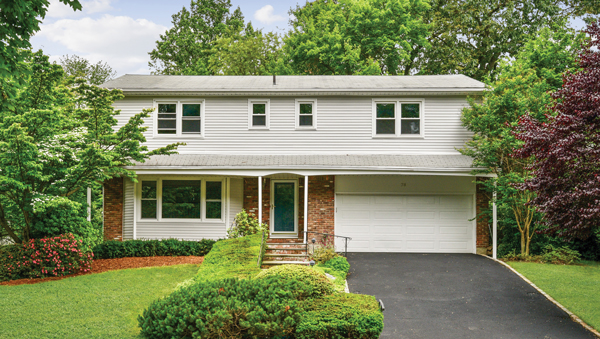For Danielle Longhitano, a listing for a co-op unit in White Plains served as the launching pad for a new career. After procuring the one-bedroom for $310,000 in September 2011, she set to work renovating it with her architect-husband, Niall Duggan, and contractor-brother-in-law Ian Duggan. After the team gutted the kitchen and bathroom, added custom built-ins and crown moldings and refinished the hardwood floors, the updated unit at 20 North Broadway hit the market. Longhitano, who’s also a Larchmont-based agent with Julia B. Fee-William Pitt Sotheby’s International Realty, served as the listing agent for the property, which resold for an additional $47,000 in December 2014. It was the highest price in the property’s history, she said.
Since then, home-flipping has become close to a full-time occupation for Longhitano. Her trio now focuses on Larchmont’s entry-level homes — listings priced under $1 million — due to rising demand and millennial buyers who tend to seek out turnkey homes. After purchasing 738 Forest Avenue for just under $498,500, the team conducted a full-service makeover that included creating an open floor plan, renovating the kitchen, redoing the front porch and landscaping, and repaving the driveway. The house was relisted for $799,000 and closed at $865,000, well above its asking price.
The possibility of a sizable profit margin such as the one at the Forest Avenue property has continued to lure real estate investors to home-flipping in Westchester County. Nationwide, flipping has reached levels not seen since 2006. About 10.6 percent of homes sold in the U.S. in the fourth quarter of 2018 were flips, according to an analysis by CoreLogic. But the price of entry is high. While today’s flippers can stand to make nearly double the profit of those who were flipping more than a decade ago, today’s rehabbers are updating older homes that require a larger cash infusion, the report found. The median age of today’s flipped homes is 39, the oldest it’s been since CoreLogic began tracking flipped homes. As a result of the higher costs, professionals are dominating the home-flipping field. In fact, CoreLogic’s report found that 40 percent of the flippers who sold homes in the fourth quarter of 2018 were corporate entities.

78 Harlan Drive in New Rochelle, before renovations
The barrier to entry
HGTV lovers may dream of channeling their inner Chip and Joanna Gaines, but few have the capital necessary to successfully flip a property. As a result, investors and real estate developers with major capital are usually behind the majority of house flips in Westchester.
“Flipping is a very fragmented business where there’s not a lot of opportunities for people to consistently generate attractive market returns because the main threshold, the main barrier to entry, is capital,” said real estate developer Dave Orth, who flips homes in Larchmont, Eastchester and Scarsdale.
“Very few people can afford to do it themselves,” said real estate agent Richard Esman of the Jennifer Leahy Team at Douglas Elliman. “You have to have the funding behind you to keep a project of this scale going. Whether it’s a Victorian or a 2000-era building, you’ll always find issues. You don’t know what’s behind the walls.”
Westchester’s fixer-upper homes don’t tend to run cheap. After all, the median home price in the county was $565,000 in the third quarter of 2019, according to an Elliman report. But local flippers are turning enough of a profit to make it work.
“I have several clients that are professional flippers [turning a profit] in today’s market in lower Westchester,” said realtor Robin Eiseman of Julia B. Fee-William Pitt Sotheby’s International Realty. “My clients are self-funded.”

Fixer-uppers purchased in the low $500,000s to $600,000s in lower Westchester can often be sold in the mid- to high $800,000s to $900,000s after a full-service renovation, Eiseman said. Though flippers are notoriously tight-lipped about the amount of capital they put into a home, she notes that it isn’t uncommon to see price markups of up to 30 to 35 percent when a house is relisted.
Case in point: 78 Harlan Drive in New Rochelle, which the flippers purchased for $600,000 in January 2019. Following a top-to-bottom renovation — which included putting in an all-new kitchen, new bathrooms, two additional bedrooms, new lighting and exterior siding. They listed the house for $885,000 in June.
“Builders typically consider at least 15 percent a reasonable return on their investment,” said Elliman’s Esman.
Longhitano has a specific equation for figuring out if a home is flippable, she said.
“A quick rule of thumb that my team and I use in looking for potential flip properties is at least a $200 per square foot difference from purchase price to sale price, assuming the square footage doesn’t change,” she said.
Many real estate developers like Longhitano start by renovating and relisting one-bedroom condos before moving on to single-family homes. When they bring their flips to market, they generally expect a quick sale.
“We’ll have an accepted offer within a week, be in contract by week two and close within 45 to 60 days,” Longhitano said. Westchester’s single-family homes sat on the market for an average of 68 days in the third quarter of this year, according to an Elliman report, which also noted that there’s only a four-month supply of homes on the local market.

78 Harlan Drive after its renovation
Randi Culang, a realtor with Compass who has represented homes that have been rehabbed by flippers in Westchester, said it’s not uncommon for house flips to receive several above-asking-price offers within the first week.
“Buyers are looking for an open-concept living space, a kitchen with high-end appliances and a modern aesthetic,” she said. Her buyers tend to be well-educated individuals moving from Manhattan because they want extra space, a more laid-back pace of living or access to the local public school systems. There’s also a bit of a savings when it comes to flipped homes.
“Renovated flips usually cost less money than new construction homes,” Culang said. “Also, oftentimes the taxes on new construction are a lot higher than these renovated homes. [They are] a much more affordable experience for a buyer, and they’re basically getting all of the same things out of it.”
The appeal of a flip
While cost is an important factor, many buyers are also drawn to the historical provenance of older homes.
In February 2019, Bedford-based general contractor BAV Industries paid $685,000 for a 1904 Victorian at 34 Croton Avenue in the Captain Merritt’s Hill Section of Mount Kisco. “It was not inhabitable,” Esman said. “It needed a lot of love and somebody that was willing to put in the dollars and the time to totally renovate the home. Electrical, plumbing, walls, floors, HPAC fixtures, finishes, bathrooms — everything needed to be completely redone.”
BAV Industries hired an architect to draw up plans that would restore the home to its former glory. Following a four-month renovation — which included putting on a new roof, refinishing the original hardwood floors and adding a new kitchen with high-end appliances — the home is now priced at $1.395 million. It’s already found a buyer, but the closing price has not been disclosed.
“People are not building Victorians today,” Esman said. “Nor are you finding homes of the stature and the bones of the house like that.”
